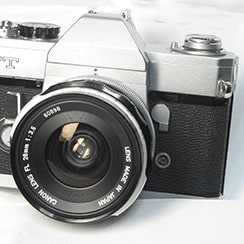Smart Photography Magazine - December 2025

Holiday Sale
1767430799
Go Unlimited with Magzter GOLD
Read Smart Photography along with 10,000+ other magazines & newspapers with just one subscription
View CatalogSubscribe only to Smart Photography
Cancel Anytime.
(No Commitments) ⓘIf you are not happy with the subscription, you can email us at help@magzter.com within 7 days of subscription start date for a full refund. No questions asked - Promise! (Note: Not applicable for single issue purchases)
Digital Subscription
Instant Access ⓘSubscribe now to instantly start reading on the Magzter website, iOS, Android, and Amazon apps.
Verified Secure
payment ⓘMagzter is a verified Stripe merchant.
In this issue
Reviews
Nikkor Z 24-70mm F/2.8 S II
Tamron 25-200mm F/2.8-5.6 Di III VXD G2
Google Pixel 10 Pro Fold
Samsung Galaxy Z Fold 7
Launched
vivo X300 Pro
Special
vivo Smartphone Awards
Photo Feature
Postcards from Galle
Showcase
Debjyoti Sarkar
Mohit Ghatak
Learning
Refer Manuals with Ease!
Printing & Beyond
Where Memories Breathe Again
Smart Photography Magazine Description:
Smart Photography is a monthly magazine that covers all aspects of photography, from techniques and tutorials to gear reviews and inspiration. It is published by Next Gen Publishing and is available in print and digital formats.
The magazine features articles on a variety of topics, such as:
* Techniques and tutorials: How-to articles on everything from taking better photos to editing your images.
* Gear reviews: Reviews of the latest cameras, lenses, and other photography gear.
* Inspiration: Articles on photography trends, techniques, and stories from photographers around the world.
* Interviews: Interviews with leading photographers, from amateurs to professionals.
* Columns: Columns by experts on topics such as composition, lighting, and post-processing.
Smart Photography is a great resource for anyone who wants to improve their photography skills. It is packed with information and inspiration, and it is a must-read for any photographer.
Here are some of the reasons why Smart Photography is considered to be one of the best photography magazines:
* It covers all aspects of photography, from techniques to gear to inspiration.
* It features articles by leading photography experts.
* It has a strong focus on practical advice and tips, making it a great resource for anyone who wants to improve their photography skills.
* It is available in both print and digital formats, making it accessible to a wide audience.
If you are interested in photography, then Smart Photography is a great resource for you. Subscribe today and start improving your photography skills!
Recent issues

November 2025

October 2025

September 2025

August 2025

July 2025

June 2025

May 2025

April 2025

March 2025

February 2025

January 2025

December 2024

November 2024

October 2024

September 2024

August 2024

July 2024

June 2024

May 2024

April 2024

March 2024

February 2024

January 2024

December 2023

November 2023

October 2023

September 2023

August 2023

July 2023
Related Titles

BASICS OF PHOTOGRAPHY

BHUTAN

50 Photo Projects

evo Photo

Heritage Homes

Travellers' World

Whistling Mornings Croaking Nights

Around The World In 18 Days

Ecuador Infinito - Discovering Ecuador

Sandpoint Review: A Photographic Journey

Royce

Digital Camera UK

The Essential Guide to Portraits 2

Essential Guide to Outdoor photography

The Essential Guide to Landscape Photography 3

The Photographer's Guide to Photoshop

Pocket Guide to Digital Photography

The Ultimate Guide to Digital Photography

The Complete Guide to Home Video

Procrastinate Magazine

Canadian Geographic Best Wildlife Photography 2022

Canadian Geographic Best of Wildlife Photography 2024

Canadian Geographic Best Wildlife Photography 2025

African Birdlife

go! Photography

Μεθώνη - Methone

Travelum

FOTOJAJS

Student Filmer

I View













































